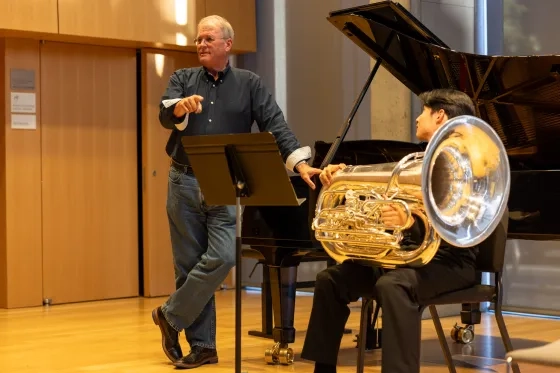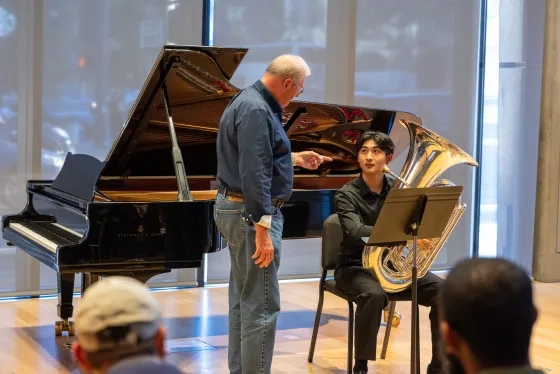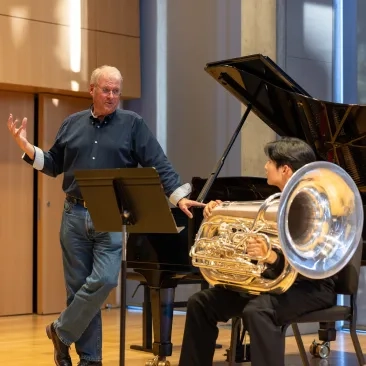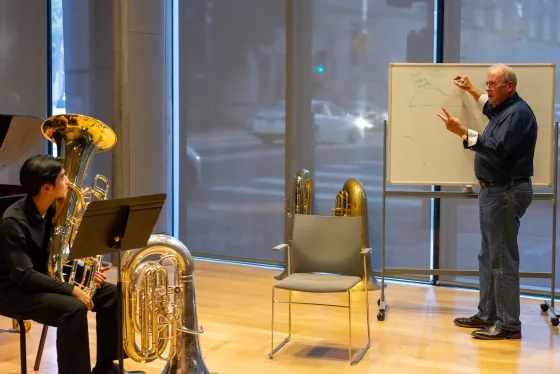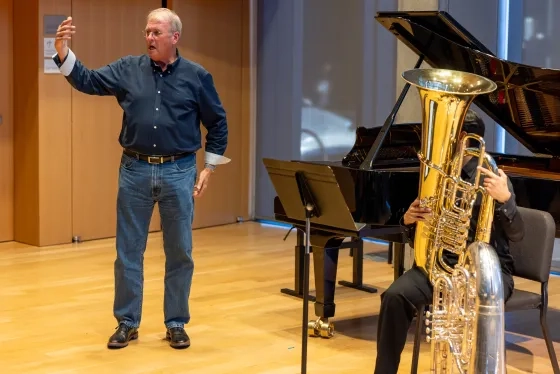Warren Deck Talks Tubas, Teaching, and Focal Dystonia
News StoryDeck, who served as Principal Tubist of the New York Philharmonic for 23 years, is also one of the most prominent classical musicians faced with focal dystonia.
It's a measure of Warren Deck's low-key nature that there are more pictures of his students than there are of him on the internet. But his journey through music—which included over two decades as principal tubist with the New York Philharmonic—is truly one for the books. Diagnosed with focal dystonia in his upper lip in 2001, which ended his playing career, Deck now teaches and gives masterclasses, along with helping to shed light on the misunderstood disorder.
Deck visited SFCM for a masterclass in September and sat down with the SFCM newsroom for insights into his teaching, playing, and history with focal dystonia.
SFCM: How did you start teaching?
Deck: I started when I was a student in college, teaching junior high and high school kids, like most folks do. I tell my students, you're probably all going to teach sooner or later even if you end up playing professionally. You may like it, or you may not like it.
One of my mentors was Arnold Jacobs, who played in the Chicago Symphony. I had a few lessons with him, and so when I got into the [NY]Philharmonic, Chicago would always come every year to play at Carnegie Hall, and we would always get together for dinner. The first year I was in the orchestra, we had dinner right across the street from Lincoln Center. And I remember him saying really distinctly, he said, 'Don't teach right now. It's going to come, but the first thing you need to do is settle into your job, figure out what your colleagues want from you and learn your job. The teaching will come.' That was safe advice; I took it and I think he was absolutely right.
How did that evolve for you?
Eventually I started teaching and I came to like it: Once I started teaching at a conservatory, it was really easy because I didn't have to provide any motivation by the time anybody ended up there. I'd go in and answer questions, basically, so it was easy from that standpoint. And a lot of my students had success, but I never took that to mean that I could teach. All I took out of that was that I didn't mess it up [laughs], so I came to like it more.
Did your focal dystonia diagnosis change that?
It was really interesting. I suddenly hated teaching again. Before, a lot of my teaching was based around this model of listening to what my students would do or wanted to do, then playing what I want them to hear and ask, 'So what's what's the difference? How do you think we should go about closing that gap?'
Then suddenly I couldn't demonstrate anymore. And I started to feel that teaching was just a nightmare, because I'd be asking these kids to do something I could no longer do. It felt completely fraudulent to me: I thought, 'I have no business asking these folks to do this, because I can't.' So it was just really, really tough sledding for a while.
What helped you get over that?
Well, I thought about a couple of things. One was, 'a quarterback has a coach, a pitcher has a coach, a tennis player has a coach, a swimmer has a coach, a gymnast has a coach. All these folks do things at a world-class level and they're helped out by people who don't do it at that level but can help them.'
So since I could no longer demonstrate, I had to figure out other things to do. Now I draw, I move, I sing, badly. I get the students to move, I play kinetic games with them where I might have them lean up their back against my back and simulate a different feeling of resistance of air, or use chair back.
The other thought was remembering my main teacher, Abe Torchinsky. He played with the Philadelphia Symphony from 1949-1972, but he wasn't playing when I studied with him. So his teaching was "just" words and ideas, but I used it to create my own concept. I'm not interested in anybody imitating me or somebody else; I'd like to help that person find their own unique voice within the bounds of what works in an ensemble.
With an instrument like tuba, there's so much whole-body awareness to playing it.
Yes, and the other thing I don't do anymore is sit by my students. I used to teach side-by-side but now I sit in front of them and stand and move around them. The main thing I want to see is that they're holding it in such a way that the mouthpiece comes to them and that they're not leaning into it, which will constrict your airflow. But seeing them from every angle lets me identify things they're doing with their body they might not be aware of, so one thing I'll do—with their consent—is, after I've explained, just lightly tap on that part of the body as a physical reminder. Then as we go on, it'll get to the point where I'll just have to point at it and they'll adjust.
Do you talk with students about the practical, economic circumstances faced by musicians today?
You know, I think everybody is aware of the situation. And if they're not, I'm willing to be the one who tells them, for better or worse. Someone I knew who studied with Harvey Phillips in Indiana said Harvey told him, "You have a greater chance of being a governor of the state of the United States than being a tuba player in an orchestra in the United States." But I always tell people, a person who has music in their life has a richer life than somebody who doesn't. I don't care how much money you have, there's a lot of ways to be rich. And I never tell anybody, "You shouldn't do this." I think the universe will tell them when it's time to maybe do something else in addition to or in place of playing the instrument, but I just can't do it.
Was there much understanding of focal dystonia as a condition when you were dealing with it?
Well, we always just used to hear "so and so lost his chops." There was a doctor named Steven J. Frucht who studied violin before going into neuroscience. There was a horn player named Glenn Estrin who was one of the first people who went to Frucht, and in 2000 they formed an organization for musicians with "task-specific focal dystonia," as it's called. But there's still a lot of misunderstanding about it. I actually met a woman when I went back to community college at 48 who had it related to her writing hand: there was a famous golfer named Sam Snead whose condition only affected his putting.
What was it like coming to grips with it?
So for me, it was in the upper lip. Whenever air hit my lip, it would contract and roll under, and you can't control pitch. So Dr. Frucht was the guy who actually diagnosed me. One thing I noticed when I was still trying to play was that if I said words that start with "B," I noticed there was a similar contraction in the lip, and when I stopped playing it went away. So I have no other symptoms other than I can't make the noise I want to make on the tuba.
I had this problem for eight years, so in a way, the diagnosis was a relief. It meant I wasn't lazy, I wasn't stupid. I really tried and tried, and then I had a medical reason, like permission to stop banging my head against a wall. As far as I know, the jury is still out on whether focal dystonia is from overuse, or if there's a genetic predisposition for it. There are people out there who say, "Oh, you must have played wrong," to which my response is, "Well, no, I didn't." And there are a lot of other people out there who didn't "play wrong" who have dystonia.
I ran into Leon Fleischer once, another musician with dystonia, and we were talking about it and he said, "What did you do when it came on?" And I said, "Well, I practiced like crazy. And he told me, "Exactly, because that's what we do. But it didn't work, did it?" And it didn't. So it's not something you can work your way out of.
What is your approach to masterclasses at this point?
Well, I'm always mindful that they're somebody else's student. So when I say something, people can take it or leave it, and if their teacher says, "that's poppycock, don't do that, I'm okay with that." It's not about me or my ego, I just want to hear some good music. So if I can play in that sandbox and contribute in that context, then I'm happy.
